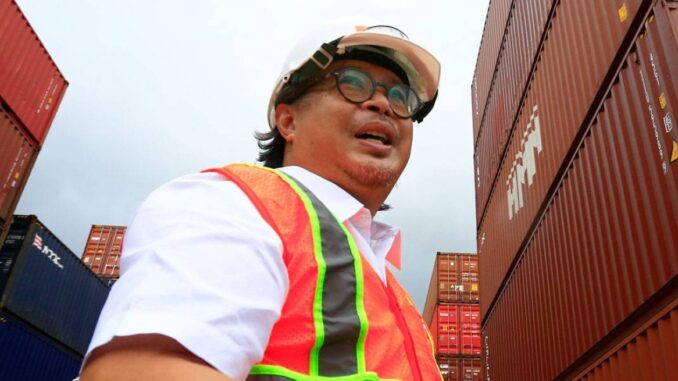
THE Philippine Ports Authority (PPA) on Sunday reminded the importers that the country’s ports are not warehouses for cargoes but are there as transit areas in the movement of goods.
In a radio interview, PPA General Manager Jay Santiago said that they are coordinating with the Bureau of Customs (BoC) to streamline their processes to discourage importers from using ports as storage areas or warehouses for their shipments.
“We are coordinating with BoC … for importers not to delay the filing of their importation entry. We are slowly reviewing our processes in PPA and in coordination with BoC,” Santiago said.
PPA General Manager Jay Daniel Santiago.(PHOTO MIKE ALQUINTO)
Santiago said the PPA has noted some importers wait for a month to file import entries for cargo even though these goods have long been unloaded in the ports.
The filing of entry signals the start of processing at the BoC.
“Some importers delay the filing of the import entry since they can save on storage cost (at the ports) compared to if they store goods in private warehouses. They pay only P700 a day (per container). For a month, that is P21,000, which is a small amount compared to the value of the shipment,” he said.
Importers have 30 days to pull out their cargo from the time these are cleared by the BoC, after which these are deemed condemned.
Santiago said the PPA has turned over to the Department of Agriculture (DA) the list of 20 consignees who failed to pull out over 500 twenty-foot equivalent units (TEUs) of shipments of rice and other agricultural products at the Manila ports as of September 30.
He said the PPA has no jurisdiction over the consignees as its mandate is strictly focused on port management.
The PPA has directed the head of operations and engineering of Asian Terminal Inc., the terminal operator of Manila South Harbor, to report the overstaying containers to the BoC for appropriate disposition in accordance with Section 1129 of the Customs Modernization and Tariff Act concerning abandoned containers.
“We believe [that] having this information on a regular basis will help both PPA and DA identify trends, address any challenges promptly, and improve overall service delivery,” Santiago said.
To prepare for the expected demand increase during the Christmas season, the PPA has also intensified its monitoring of pork, chicken, and onion inventories.
FRANCIS EARL CUETO





Be the first to comment